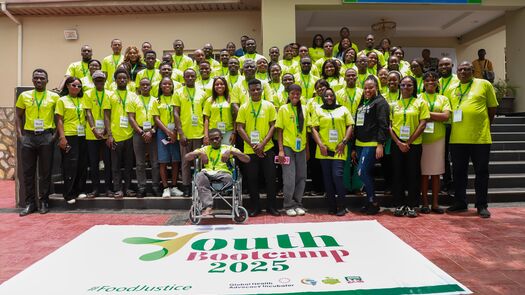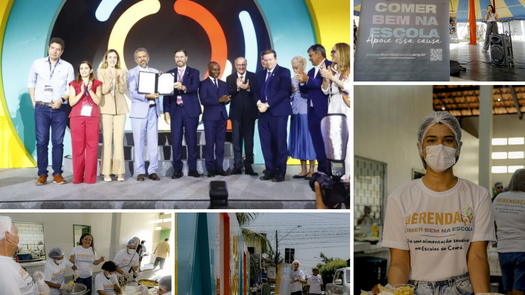November 25, 2025
With the rapid adoption of Front of Package Warning Labels (FOPWL) on unhealthy food and beverages across the region, Latin American advocates have gained a wealth of knowledge on how to successfully promote this important policy. In tandem, a network of lawyers convened annually to share challenges and lessons learned, including ways to successfully address a regional trend: the use of trade and other legal arguments by the food and beverage industry to block public health policy advancement.
A new book, “Law, Trade, and Nutrition Labeling: Reflections and Experiences from Latin America,” documents many of these experiences. Published in Spanish in 2022, the book was recently re-released in English. The Global Health Advocacy Incubator (GHAI) and DeJusticia co-hosted a webinar to launch it in April 2025. The webinar was moderated by Juan Carballo (GHAI) and Diana Guarnizo (DeJusticia, Colombia), who co-edited the book with Professor René Ureña from the University of the Andes. In addition, contributing authors Laís Amaral (IDEC, Brazil), Diego Rodríguez (OMIS, Uruguay) and Gianella Severini [Campaign for Tobacco-Free Kids (CTFK)] shared highlights from their chapters of the book.
During the webinar, authors praised the power of collaboration and creating a community of practice, such as the legal network in Latin America. Below are the key takeaways, including advice for lawyers and advocates.
To listen to the full webinar, click ENGLISH or SPANISH.
Diana Guarnizo, DeJusticia (Colombia), who co-edited the book shared the genesis of the idea. After years of effectively fighting these legal challenges, they recognized they needed to share their experiences, including arguments claiming that FOPWL violates international trade laws. After all, these trade arguments were beginning to pop up in other regions in the world.
“Our hope is that this book will serve as a place for the history and struggle on how these laws were passed in Latin America and to find new ideas to continue promoting nutritional labeling laws in their countries,” said Diana Guarnizo, DeJusticia.
Gianella Severini, CTFK, co-authored two chapters in the book that covered how to address technical barriers to trade arguments and how international trade and economic forums are used to obstruct the adoption of FOPWL policies. During the webinar she emphasized the importance of understanding trade laws. It helps advocates respond effectively and can also be a powerful tool to proactively integrate trade considerations in the design of the policy and the advocacy process. She also shared successful examples from tobacco control that can be a resource to food policy advocates and lawyers.
“Ultimately the better you understand the trade law arguments the better you can inform the process and the better you can protect the measure.” Gianella Severini, CTFK
Diego Rodríguez, OMIS (Uruguay) co-authored the Uruguay chapter covering how industry leveraged economic trading bodies in Uruguay and why it’s important to emphasize every country’s sovereignty and rights to determine what law it needs to protect the health of its citizens. The industry leveraged Mercosur (an economic trade bloc between Argentina, Bolivia, Brazil, Paraguay and Uruguay) to delay the FOPWL regulation while it was being debated, claiming it posed trade barriers. Diego also highlighted why civil society must leverage communications to raise awareness about the need for these policies to counter these trade narratives.
“Uruguay did a social media campaign highlighting what was not being implemented and who was not complying with the labeling law, which elicited a strong industry reaction. The battle for our issue is to raise awareness and understanding of the harmful effect of ultra-processed foods.” Diego Rodríguez, OMIS, Uruguay
Laís Amaral, IDEC (Brazil) co-authored the Brazil chapter, which outlines different steps the industry took to block the FOPWL policy and how civil society proactively responded. It also highlights how civil society demanded participation and transparency in the policy process. During the webinar, she highlighted Brazil’s unique participation in Mercosur by sending a representative from its national health surveillance agency versus other countries who only send representatives from commerce or economic sectors. While it has not shielded Brazil from industry interference, it does enable civil society to participate in the process. She also shared how civil society and academia in Brazil participated in the FOPL discussions to inform the policy development and process.
“As civil society, it’s important to demand transparency so you can anticipate next steps. It’s not easy to establish social participation but it’s important to demand the balanced participation of civil society in the process.” Laís Amaral, IDEC
As more countries look to adopt and defend FOPWL policies, the Latin American experience offers invaluable lessons on navigating trade and legal threats. The new English edition provides practical strategies and inspiration drawn from the region’s civil society organization’s deep collaboration and persistent civil society advocacy, Latin American advocates have carved a path forward – one that others can look to and build upon.
Law, Trade, and Nutrition Labeling: Reflections and Experiences from Latin America, is a collaboration between DeJusticia, the University of the Andes and GHAI. The book, first released in November 2023, includes academic articles connecting international trade law and FOPL. The book was edited by Diana Guarnizo Peralta (DeJusticia), René Ureña Hernández (University of the Andes) and Juan Martín Carballo (GHAI). The book includes contributions from multiple authors from Argentina, Brazil, Ecuador, Mexico, Peru and Uruguay.
To listen to the full webinar, click ENGLISH or SPANISH.
To read the book, click SPANISH EDITION or ENGLISH EDITION.



